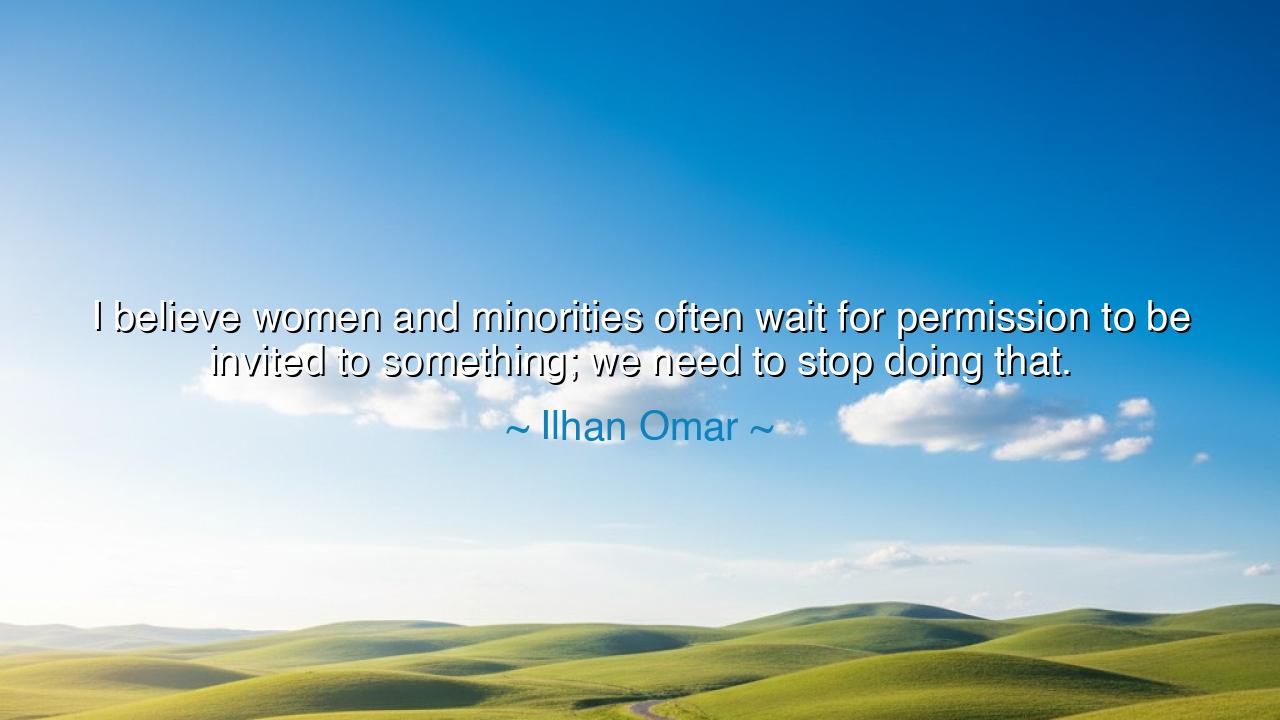
I believe women and minorities often wait for permission to be
I believe women and minorities often wait for permission to be invited to something; we need to stop doing that.






The words of Ilhan Omar, spoken with the fire of conviction, strike at the chains of hesitation: “I believe women and minorities often wait for permission to be invited to something; we need to stop doing that.” In these words she proclaims a call to action, a breaking of silence, a demand for self-assertion. Too long have women and minorities been taught to wait at the door, to seek approval before entering, to believe that belonging is a gift granted by others. Omar’s wisdom is clear: the time of waiting must end; the time of stepping forward has come.
The ancients knew well the cost of hesitation. In the story of Esther, queen of Persia, her people faced destruction. She could have waited for the king’s summons, for the golden scepter to be extended. Instead, she walked boldly into the throne room unbidden, risking death to save her people. In her courage, we see the truth Omar names: sometimes salvation, justice, and destiny are seized, not granted. Permission is a prison, and freedom comes only when one dares to act without waiting.
In Omar’s own life, this truth was written in struggle. A refugee child from Somalia, she entered the halls of American power not by waiting for an invitation, but by insisting that her voice be heard. She became one of the first Muslim women in Congress, breaking barriers that had long seemed unshakable. Her presence itself was a declaration: she did not wait for others to decide she belonged—she claimed belonging by her courage to stand.
This teaching also unmasks the subtle chains of expectation. Societies often whisper to women and minorities: “Stay quiet. Follow. Wait your turn.” Yet turns never come unless they are taken. Omar’s words are both encouragement and warning: the world does not freely yield space, it must be claimed. And those who wait for invitation may wait a lifetime, while those who step forward create the path for generations yet unborn.
Let the generations remember: the doors of destiny do not open to those who wait politely; they open to those who knock with courage, or even to those who push them down with justice in their hands. The wisdom of Ilhan Omar is thus a summons—rise, speak, step forward. Do not wait for permission, for the world is shaped by those who dare to claim their place within it.






TAVu Truc Anh
I think Ilhan Omar’s quote really speaks to the need for self-empowerment. It’s easy to see how women and minorities can feel they’re not ‘allowed’ to participate in spaces of power. But how do we challenge the narrative that they need permission to lead or speak up? Is this something we can change by creating more opportunities for leadership, or does it require a cultural shift in how society perceives these groups?
NXPhuong Nguyen Xuan
Omar’s words are a call to action, reminding women and minorities of their agency and the importance of asserting themselves. But how much of this mentality is ingrained in social structures, and how can we dismantle it? How can we help foster an environment where people are encouraged to take initiative and not wait for an invitation, particularly in spaces where they’ve historically been excluded?
TTan
Ilhan Omar’s perspective is powerful, especially considering the historical context where women and minorities have had to fight for recognition and inclusion. How can we overcome the ingrained idea that we need others' approval to pursue our goals? Are we doing enough to encourage self-empowerment, or are we still placing limits on who can lead, speak, and act in society?
THLe Kim Tan Huyen
Omar’s statement challenges a pervasive issue: the need for external validation before taking action. It’s true that women and minorities, especially in professional and political spaces, often hesitate or wait for a ‘green light’ to participate. But what can we do to build confidence in these groups to act independently and assertively? What role do systemic changes play in encouraging these voices to rise without waiting for permission?
Hhula
Ilhan Omar’s quote resonates deeply because it speaks to the societal conditioning that women and minorities often face, waiting for approval or permission to take space. How often do we see these groups hesitant to step forward, not because of lack of ability, but because they feel they must be invited? How can we shift this mindset so that they feel empowered to claim their rightful place without waiting for permission?